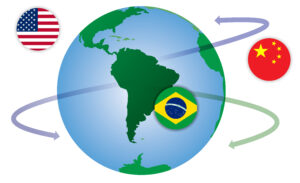
Nearshoring in Latin America: Who Could Benefit Most?
Countries like Uruguay and Chile offer good conditions, despite being far from the U.S.

Africa’s Lessons for Latin America
Fellow members of the Global South show what a more unified regional approach can achieve.

Lecciones de África para América Latina
Integrantes del Sur Global demuestran lo que se puede lograr con un enfoque más consensual.

What the World Gets Wrong About Latin America’s Foreign Policy
Assumptions about the region’s homogeneity and limitations on the international stage don’t hold up, writes one expert.

The AI Revolution Is Coming for Latin America. Is It Ready?
The region needs a regional strategy to bolster the technology’s positive effects and combat its use by bad actors, write two experts.

Lula’s Fraught South America Summit
Brazil’s effort to restart regional dialogue is good news. The challenge will be to keep it going once the second pink tide starts to ebb.

Thinking Abroad: Latin America’s Foreign Policies
AQ tracks priorities in external relations, including positions on Venezuela and China, in eight countries.

Con Lula, Brasil puede asumir el liderazgo regional. ¿Lo hará?
Un peso pesado de la diplomacia vuelve a dirigir el país más grande de América Latina. Pero ejercer el liderazgo regional puede resultar más difícil de lo que Lula y otros creen.

Sob o comando de Lula, o Brasil pode voltar à liderança regional. Mas será que o país assumirá esse papel?
Um grande nome da diplomacia está novamente no comando do maior país da América Latina—mas o caminho para Lula chegar a uma posição internacional de influência está repleto de obstáculos.

Under Lula, Brazil Can Take On Regional Leadership. Will It?
A diplomatic heavy hitter is back at the helm of Latin America’s largest country—but the path to an influential international role is full of obstacles.

Nuevo en AQ: Lo que significa Lula para el papel de América Latina en el mundo
El destacado perfil de Lula lo convierte en un líder natural en temas como el cambio climático, aunque las recientes polémicas y los retos internos de Brasil podrían limitar sus ambiciones regionales.

NEW AQ: What Lula Means for Latin America’s Role in the World
Lula’s high profile makes him a natural leader on issues like climate, although recent controversies, and domestic challenges in Brazil, may limit his regional ambitions.

Petro, Lula and the Future of Latin American Integration
A second “pink tide” would create greater opportunities for dialogue. But structural obstacles abound.


